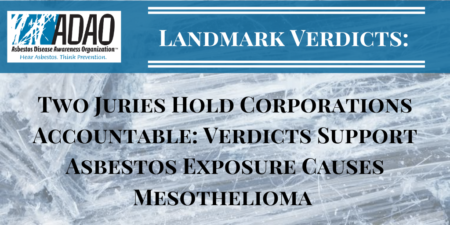Posted on July 27, 2023
July was a momentous month for civil justice in California.
 A California jury in Los Angeles unanimously declared victory for Joel Hernandezcueva, a father of four young children who tragically died from asbestos-caused mesothelioma. He was exposed to asbestos while working as a janitor at the Park Place complex in Irvine, Calif. The jury determined that Union Carbide Corp. acted with malice in relation to his death and awarded his family $107 million dollars.
A California jury in Los Angeles unanimously declared victory for Joel Hernandezcueva, a father of four young children who tragically died from asbestos-caused mesothelioma. He was exposed to asbestos while working as a janitor at the Park Place complex in Irvine, Calif. The jury determined that Union Carbide Corp. acted with malice in relation to his death and awarded his family $107 million dollars.
This trial has drawn renewed attention to the issue of asbestos exposure, which continues to pose a threat to public health. The United States still lacks a comprehensive ban on the imports and use of this deadly substance. It is well-known that there is no safe level of asbestos exposure, as it leads to numerous fatal illnesses, including mesothelioma and various cancers. This is why we are fervently urging Congress to take action and ban asbestos by passing the Alan Reinstein Ban Asbestos Now Act (ARBAN) of 2023.
Joel tragically passed away in 2014. As a janitor, he was exposed to asbestos fibers while cleaning up dust during renovations at the Park Place complex. According to the family’s lawyer, Union Carbide had long claimed that its asbestos was “different,” “innocuous,” and “not harmful,” while internal corporate documents revealed the truth: countless individuals, like Joel, would succumb to its harmful effects.
This case mirrors the experiences of many workers who were exposed to asbestos despite their employers’ knowledge of its carcinogenic properties. Unfortunately, asbestos remains legal and lethal in the United States today.
Additionally, this month, another California jury awarded a significant $18.8 million verdict to Emory Hernandez Valadez, a 24-year-old mesothelioma patient and longtime user of Johnson & Johnson’s baby powder. Valadez alleged that asbestos exposure from the talc-based baby powder led to the development of his cancer.
Asbestos, a known carcinogen, is responsible for nearly 40,000 Americans each year. The Alan Reinstein Ban Asbestos Now Act aims to safeguard public health by implementing a comprehensive asbestos ban and supporting research into asbestos-related diseases, benefiting individuals like Emory who are already suffering from asbestos-caused illnesses.
These trials highlight the growing awareness among juries of the lethal decisions made by employers regarding their workers’ health. While the justice system continues to hold corporations accountable for their negligence, Congress can take a proactive stance by putting an end to the pain and suffering caused by asbestos, once and for all, through banning its imports and use.
Linda Reinstein
